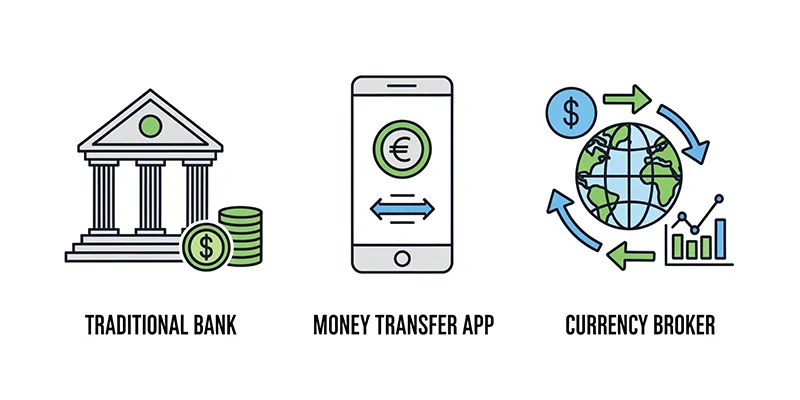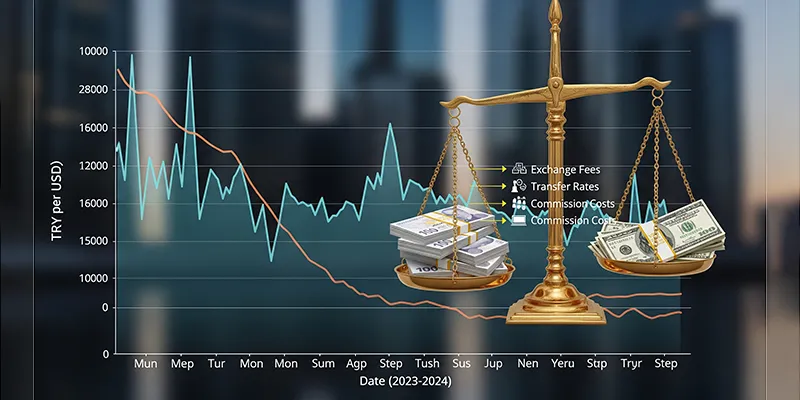Purchasing property in Turkey offers exciting opportunities, from vibrant culture to attractive investment prospects. A critical step in this process is securely and efficiently transferring significant funds across international borders. This guide provides expert insights and practical advice to ensure your money reaches its destination safely, efficiently, and cost-effectively for your Turkish property acquisition.
We will explore various transfer methods, delve into exchange rates and fees, highlight essential security measures, and navigate the specific legal and practical considerations unique to Turkey.
Choosing Your Transfer Method: A Comparative Guide
Selecting the right method for transferring a large sum is fundamental for a secure and efficient property purchase. Each option has distinct advantages and disadvantages regarding cost, speed, and convenience.

Traditional Banks
Banks are a familiar choice for international transfers, often providing in-person service and online banking. They are widely used and can deal with banks globally. The primary mechanism for these transfers is typically the SWIFT network.
While familiar and perceived as reliable, traditional banks can be slower and more expensive. This is often due to exchange rate markups and fees that can be high and complex. Third-party charges may also apply if the SWIFT network is used, increasing the overall cost. Delivery times can range from 3 to 5 business days.
Consequently, while a common option, traditional banks may not always be the most cost-effective or fastest choice for substantial property payments.
Specialist Money Transfer Providers
These providers specialize in international payments, often using modern systems to minimize intermediaries. They are typically regulated similarly to banks, helping ensure fund safety.
- Wise: Wise facilitates online or app-based transfers, consistently using the real mid-market exchange rate and applying low, transparent fees. This approach can lead to significant savings compared to conventional banks. Wise operates its own payment networks, which helps avoid the SWIFT system and its associated third-party charges.
- Revolut: Known for competitive exchange rates, Revolut generally imposes no additional exchange fees on weekdays, provided the transfer amount is within plan limits. Discounts on bank transfer fees are also available for premium plans. Transfers between Revolut accounts are free and almost instantaneous, typically arriving in about 20 seconds. The platform employs robust cybersecurity, biometric security, and offers 24/7 support, enhancing transaction security.
- Lumon: This provider focuses on simplifying currency transfers specifically for property purchases. Lumon offers access to currency specialists who can assist in planning transfers, locking in favorable rates, and avoiding hidden fees, particularly for large sums like deposits or final payments. Lumon asserts that its exchange rates are "bank-beating" and that it charges no hidden fees.
- Western Union: This service allows sending up to $50,000 to a bank account in Turkey online when payment is made via bank transfer, with the amount received in Turkish Lira. The recipient's International Bank Account Number (IBAN) is required for such transfers.
Specialist providers are often cheaper and faster than traditional banks, offer a broad range of currencies, and provide the convenience of online or app-based services. Many are recognized for transparent fees and competitive exchange rates. Enhanced security features, such as those offered by Revolut, further bolster their appeal.
However, potential drawbacks include the necessity for account creation and verification , the common absence of face-to-face service , and variability in fees, rates, and transfer times among different providers. Overall, these providers are frequently a valuable and convenient option for large international property payments.
International Currency Brokers
International currency brokers are foreign exchange specialists offering more complex FX services, such as forward exchange contracts. Lumon, for instance, operates in this domain. A significant advantage is their ability to help secure strong rates and facilitate proactive financial planning, which is particularly beneficial with volatile currencies like the Turkish Lira.
Their exchange rates typically surpass those offered by traditional banks , and clients benefit from personalized service from a dedicated specialist. On the downside, opening and verifying an account is usually a prerequisite , and specific services vary considerably by provider. While their rates generally outperform banks, they may not always be the absolute cheapest available. These brokers are well-suited for buyers aiming to mitigate currency risk on large, high-value transactions.
Other Methods with Specific Cautions for Property Purchases
Several other methods exist for transferring money, but their suitability for large property purchases requires careful consideration due to inherent limitations or risks.
- Official Payment according to a Property Sale-Purchase Contract: This method is specifically highlighted as a functional and official route for transferring money directly to a company account (such as a developer's) based on a formal contract. Individual persons cannot receive money through this channel. A key advantage is its currency flexibility, allowing transfers in USD, EUR, and even Rubles, provided the developer maintains a corresponding bank account in a Turkish bank, as observed with Denizbank. This method is considered a viable and official route for property payments, aligning with the need for traceability in real estate transactions.
- Cryptocurrency: It is possible to purchase digital currency and then transfer it to a Turkish crypto exchange for conversion and withdrawal to a Turkish bank account in Lira. However, this method comes with specific prerequisites: the individual must have an existing Turkish bank account and possess the right of long-term stay to open an account on a Turkish crypto exchange. While an alternative for those comfortable with digital assets, it carries inherent volatility risks and requires adherence to these specific conditions.
- Bringing Cash from Abroad: Individuals are permitted to physically bring up to $10,000 per person, including children, into Turkey. This method is only suitable for very small deposits or initial expenses and is generally not recommended for the bulk of a property purchase due to low limits and significant security risks associated with carrying large sums of cash.
- "Golden Crown" / Transfers from Direct Relatives: These methods facilitate smaller transfers, typically up to $5,000 per person or relative. For larger sums, multiple transfers would be required. This approach is generally impractical and less secure for substantial property payments due to its inherent limitations and the logistical complexity of numerous transactions.
- Mir Card Withdrawal: While available, this method is frequently associated with high commissions and unfavorable exchange rates. Consequently, it is generally not recommended for large property payments due to its cost inefficiency.
- Courier Company / Money Transfer Offices (General): These services are popular for general money transfers within and to Turkey, known for their speed and relatively low fees, typically around 3% of the transferred amount. Courier companies, in particular, are often affiliated with the Turkish government, which lends them significant credibility. While effective for general transfers, their suitability for large property sums necessitates a careful assessment of their specific limits and security protocols for high-value transactions.
The landscape of international money transfers for large sums is evolving. Traditional banks, while familiar, are often characterized by slower processing times and higher costs due to their reliance on the SWIFT network. Newer specialist providers like Wise and Revolut offer faster, more cost-effective alternatives by utilizing modern systems or their proprietary networks. Currency brokers, such as Lumon, provide specialized services for substantial amounts, including the ability to lock in exchange rates.
The emergence of a specific "official payment according to a property sale-purchase contract" method for property developers, alongside the increasing viability of cryptocurrency, indicates a significant diversification of secure transfer options beyond conventional banking. This transformation means that buyers now have a broader array of choices, allowing them to select methods that align more closely with their priorities, whether that be speed, cost-efficiency, or specific security features.
For high-value transactions like property purchases, the purpose of the transfer and the type of recipient (individual versus company) are critical determinants of the most secure and legally compliant method. The emphasis on an "official payment according to a property sale-purchase contract" directly to a company account underscores a deeper regulatory requirement within Turkey for real estate transactions. This approach prioritizes official, traceable payments to the developer or seller's legal entity, rather than personal accounts, significantly mitigating fraud risk and ensuring adherence to Turkish property laws.
Beyond simply comparing fees and rates, a fundamental factor in selecting a secure transfer method is the regulatory oversight and inherent trustworthiness of the provider. Regulations are designed to safeguard funds, and it is imperative that chosen providers are properly regulated. The robust security measures employed by providers like Revolut, including biometric protection and anti-fraud warnings , or the government affiliation of certain courier companies in Turkey , provide a layer of confidence. Buyers should actively seek out providers that explicitly detail their regulatory compliance and security protocols, particularly for large, sensitive transactions.
Comparison of Major Transfer Methods for Property Purchase in Turkey
- Traditional Bank
- Pros: Familiarity, face-to-face service available
- Cons: Slower, higher and complex fees, exchange rate markups, third-party charges
- Best For: General international transfers, small amounts, or when familiarity is paramount
- Typical Fees/Rates: High, complex, hidden markups
- Typical Transfer Time: 3-5 business days
- Specialist Money Transfer Provider (e.g., Wise, Revolut, Lumon, Western Union)
- Pros: Often cheaper & faster, transparent fees, competitive exchange rates, broad currency range, online/app convenience, enhanced security
- Cons: Requires account verification, often no face-to-face service, variability in fees/rates/times
- Best For: Large property payments, regular transfers, cost & speed efficiency
- Typical Fees/Rates: Low, transparent, mid-market rates
- Typical Transfer Time: Minutes to 3-5 business days (provider dependent)
- International Currency Broker
- Pros: Foreign exchange specialists, can lock in favorable rates, mitigate currency risk, personalized service
- Cons: Requires account verification, services vary, rates may not be absolute cheapest
- Best For: Large, high-value transactions, mitigating currency volatility
- Typical Fees/Rates: Competitive, may involve spread
- Typical Transfer Time: Varies, often similar to bank wires
- Official Payment via Contract
- Pros: Direct to company account, legally compliant, allows various currencies (e.g., Rubles)
- Cons: Cannot be received by individuals, requires developer with specific bank accounts
- Best For: Primary method for property payments to developers/companies
- Typical Fees/Rates: Varies by bank/developer
- Typical Transfer Time: Varies by bank
- Cryptocurrency
- Pros: Potentially fast, alternative for specific situations
- Cons: Requires Turkish bank account & long-term stay rights for exchange, high volatility, complex
- Best For: Niche cases, for those comfortable with crypto & meeting prerequisites
- Typical Fees/Rates: Varies by exchange, network fees
- Typical Transfer Time: Minutes to hours
- Cash/Small Transfers (e.g., Golden Crown, Relatives)
- Pros: Quick for small sums, no bank account needed for cash
- Cons: Very low limits, not suitable for large property sums, security risks (cash), multiple transfers needed
- Best For: Very small deposits, living expenses, emergency funds
- Typical Fees/Rates: Varies, potentially high for multiple small transfers
- Typical Transfer Time: Instant (cash) to hours/days
Mastering Exchange Rates and Fees: Get More for Your Money
Understanding the dynamics of exchange rates and fees is paramount to maximizing the value of a property investment in Turkey. Even small percentage differences on large sums can translate into thousands of dollars saved or lost.

Understanding the Mid-Market Rate
The mid-market exchange rate is the true, real-time rate at which currencies are bought and sold on global markets, without any added markup. Its importance lies in the fact that many banks and traditional providers often apply a markup to this rate, which effectively acts as a hidden fee.
In contrast, specialist providers like Wise frequently utilize the real mid-market rate, ensuring transparency and potentially leading to significant savings. Similarly, Revolut emphasizes competitive rates and the absence of additional exchange fees on weekdays. A practical tip is to always compare the rate offered by any provider against the mid-market rate, which can be easily found using reputable currency converter tools.
Spotting Hidden Fees and Markups
The advertised transfer fee is often only one component of the total cost. Exchange rate markups frequently represent the largest hidden expense, particularly when dealing with substantial transfers. Additionally, third-party charges, especially those associated with the SWIFT network, can also apply and contribute to the overall expenditure.
Reputable providers prioritize transparency, clearly displaying all costs within their applications or before confirming a transfer. Lumon, for instance, explicitly states its commitment to avoiding hidden fees. A key actionable tip is to always inquire about the exact amount the recipient will receive in their bank account, rather than focusing solely on the amount being sent. This approach ensures a comprehensive understanding of the total cost involved.
Timing Your Transfer
The Turkish Lira is known for its volatility, meaning exchange rates can fluctuate considerably, especially in dynamic markets you encounter when buying property in Istanbul. This inherent instability can significantly impact the final value of large transfers. Global market closures on weekends generally make them the least favorable time to exchange money, potentially leading to less advantageous rates or the application of weekend fees.
It is also important to remember that "weekends" may not align with Saturday and Sunday in all countries. Furthermore, bank, public, and religious holidays in either the sending or receiving country can cause delays in transfers, which might result in missing out on a favorable exchange rate. A strategic approach involves planning transfers in advance and, where possible, locking in rates with a currency specialist to mitigate currency risk.
The convenience or familiarity associated with using a traditional bank for large international transfers often comes with a substantial financial premium. This is primarily due to hidden markups in exchange rates and the complex fee structures that banks typically employ. Specialized financial service providers, by focusing exclusively on money transfers and leveraging modern, often proprietary, networks, are able to offer a demonstrably better value proposition. This suggests that buyers prioritizing cost-efficiency for their property payments should look beyond conventional banking solutions.
For a significant financial undertaking like a property purchase, currency exchange transcends a simple transaction; it becomes a critical risk management activity. The inherent volatility of the Turkish Lira creates considerable exposure to currency fluctuations, which can directly diminish purchasing power. Therefore, proactive strategies become essential financial planning tools. These include carefully timing transfers, being aware of market hours, and, crucially, engaging currency specialists to "lock in" favorable rates through mechanisms like forward contracts. This transforms what might seem like a straightforward money transfer into a strategic financial maneuver, underscoring the necessity for professional guidance.
Fortifying Your Funds: Essential Security Measures
When transferring substantial funds for a property purchase, security is not merely a desirable feature; it is an absolute and non-negotiable requirement. Protecting such a significant investment from fraud and errors demands meticulous diligence and a thorough understanding of the safeguards in place.

Choosing Regulated and Reputable Providers
International payments are subject to stringent regulations designed to keep funds safe. These regulations are imposed by both the sender's home country and the destination country. It is therefore paramount to ensure that any chosen provider is "properly regulated" and authorized by the relevant regulatory agencies in both jurisdictions.
A key aspect of this regulatory compliance is the Know Your Customer (KYC) and Anti-Money Laundering (AML) processes. This typically involves creating and verifying an account, which necessitates providing documents proving identity and address. For certain destination countries, proof of the source of funds may also be required. These compliance measures should be viewed as integral security features, rather than mere bureaucratic hurdles.
Furthermore, when selecting a provider, it is advisable to look for those that employ innovative technology, robust cybersecurity systems, biometric security, and two-factor authentication. Revolut, for example, utilizes a dedicated financial crime team and issues anti-fraud warnings, demonstrating a commitment to safeguarding user funds.
Verifying Recipient Details (Crucial for Property Payments)
Accuracy in providing recipient information is of utmost importance. Inputting incorrect details can lead to significant delays or, more critically, result in funds being sent to the wrong account. For transfers to Turkey, the required details typically include the recipient's full name, address, email address, and their 26-character International Bank Account Number (IBAN), which begins with 'TR'. A BIC/SWIFT code may also be necessary.
It is imperative to double-check all information, ideally twice, and to confirm these details directly with the recipient through a verified and secure communication channel. For property purchases, this means meticulously confirming details with both the legal counsel and the seller or developer.
Beware of Scams
Vigilance against scams is essential. Certain red flags should immediately raise suspicion: being asked to wire money through unusual means, feeling rushed into making a payment, being asked for passwords or other personal information, receiving a QR code requesting approval for a "collect" transaction, or being offered a commission to facilitate the movement of large sums of money. If an offer or request appears too good to be true, it most likely is.
Reputable providers often offer 24/7 support and issue anti-fraud warnings to protect their users. A critical actionable tip is to never send cash through the mail, as it cannot be traced if lost.
Regulatory compliance, including adherence to KYC and AML protocols, is not merely a bureaucratic formality but a fundamental security mechanism. It ensures that service providers operate under strict oversight, significantly reducing the risk of fraud and illicit financial activities. The requirement for detailed account verification, identity, address documents, and sometimes proof of the source of funds reinforces this. The involvement of legal professionals in ensuring compliance with regulatory mandates for investment funds further underscores the rigor expected for direct property purchases.
For the individual buyer, selecting a regulated provider and diligently fulfilling all compliance requirements is a proactive step in protecting their funds, as it ensures the transaction is monitored and traceable by relevant authorities. Any hesitation or resistance from a provider regarding these required documentations should be considered a major warning sign.
Despite the implementation of advanced cybersecurity systems by providers , the human element often remains the primary vulnerability in the security chain. Scammers frequently exploit psychological weaknesses such as urgency, misplaced trust, or a lack of knowledge, rather than attempting to breach technical safeguards. The warning that "inputting the wrong information can lead to delays" or misdirected funds further highlights this point. Therefore, personal vigilance, meticulous double-checking of all transaction details, and a healthy skepticism towards any unusual or suspicious requests are as crucial as the technological security infrastructure provided by the service.
Navigating Turkish Specifics: Legal and Practicalities for Property Buyers
Transferring funds for a property purchase in Turkey is not solely a financial transaction; it is deeply intertwined with Turkish legal and administrative requirements. Understanding these specifics is vital for a smooth and secure acquisition.

The Indispensable Turkish Tax Number and Bank Account
Obtaining a Turkish Tax Number, officially known as "Vergi Kimlik Numarası," is the initial and mandatory step for engaging in any financial transaction within Turkey, including the purchase of property and the opening of a bank account. This number serves as a unique identifier for all individuals and entities operating within Turkey's financial and legal systems.
Following the acquisition of the tax number, it is essential to open a Turkish bank account, which is a prerequisite for completing any real estate transaction. In some instances, certain banks may facilitate the remote opening of an account with a valid Power of Attorney (POA).
The Role of a Local Lawyer
The appointment of an independent Turkish property lawyer is of paramount importance. This legal professional should ideally possess extensive experience in Turkish property law and be fluent in the buyer's language. It is strongly recommended to engage such a lawyer before committing to any property purchase or making any deposit payments. An independent lawyer is defined as one who has no connection or affiliation with the seller or any agent acting on their behalf, such as an estate agent.
The key services provided by a lawyer are comprehensive and critical. They conduct thorough due diligence on the property's title deed (TAPU), meticulously checking for any encumbrances, debts, or legal issues. They also verify the seller's legitimate ownership rights, ensure the property is not located in restricted zones, and provide translation and explanation of all contracts and legal documents. Furthermore, they manage the necessary documentation, oversee payments, and guide the entire title deed transfer process. Lawyers can also clarify VAT liability and manage documentation required by the Turkish Revenue Administration.
Specific Requirements for Turkish Citizenship by Investment For buyers pursuing Turkish Citizenship by Investment, this transfer process is even more critical. The entire purchase amount must be officially transferred to a Turkish bank and converted to Lira to obtain a "Foreign Exchange Purchase Certificate" (Döviz Alım Belgesi), a mandatory document for the citizenship application. This highlights the importance of using official banking channels and proper documentation.
Official Payment via Property Sale-Purchase Contract
This method stands out as a preferred, functional, and secure approach for transferring substantial sums of money directly to a developer's or company's account. Such transfers are executed based on a formal property sale-purchase contract. It is crucial to understand that individual persons are not permitted to receive funds through this specific channel.
A notable advantage of this method is its currency flexibility; transfers can be made in various currencies, including USD, EUR, and even Rubles, provided the developer maintains a corresponding bank account in Turkey. This method aligns seamlessly with Turkish legal requirements for traceability and accountability in property transactions, making it a highly recommended route for formal property payments.
Understanding Turkish Property Ownership Laws
Foreigners are generally permitted to purchase property in Turkey with relatively few restrictions, and upon acquisition, they receive full freehold title, known as "Tapu". However, certain limitations apply. Properties located near military zones or strategically important areas are off-limits, and specific permits may be necessary for purchases in rural or border regions.
Furthermore, foreign individuals cannot own more than 30 hectares of land in total across Turkey, nor can they purchase more than 10% of any single town's land area. All real estate transactions in Turkey must be officially registered with the General Directorate of Land Registry and Cadastre. It is critical to ensure that the property's title deed (TAPU) is free from any legal disputes or debts prior to transfer.
Another important consideration is the habitation certificate; obtaining this document can be complex and time-consuming, and prospective buyers should be aware of potential challenges if a property lacks one. Regarding capital mobility, Turkey generally allows for the free transfer of profits and proceeds from property sales, provided that all tax liabilities are fulfilled. However, it is important to note that recent economic volatility has led to increased oversight by the Central Bank, aimed at preventing capital flight.
Alternative Transfer Methods (with Cautions for Property Payments)
As previously discussed, methods such as physically bringing cash into the country, utilizing "Golden Crown" transfers, direct transfers from relatives, or Mir Card withdrawals are generally not suitable for the substantial sums required for property purchases. This is due to their inherent limits, associated security risks, or unfavorable exchange rates. While cryptocurrency presents an alternative, it necessitates specific prerequisites, including an existing Turkish bank account and the right of long-term stay to open an account on a Turkish crypto exchange. These methods are more appropriate for smaller expenses or highly specific niche situations rather than the primary means of funding a property acquisition.
The act of transferring funds for a Turkish property is not an isolated financial action but an integral component of a multifaceted legal process. The explicit requirement to obtain a Turkish Tax Number and open a Turkish bank account before initiating fund transfers underscores this integration. Furthermore, the designated "Official payment according to a property sale-purchase contract" directly links the financial transaction to a formal legal document and mandates payment to a company account.
The paramount importance of engaging independent legal counsel for due diligence and ensuring overall compliance further illustrates this interconnectedness. Neglecting any of these legal prerequisites can compromise the security and legality of the fund transfer itself. This necessitates that buyers adopt a holistic perspective, viewing financial transfers through a legal lens, and prioritizing compliance with Turkish regulations as much as they do cost-efficiency or speed. The emphasis on official contract payments to a legal entity's account highlights the Turkish legal system's demand for transparency and traceability in real estate transactions.
While Turkey's Foreign Direct Investment (FDI) Law No. 4875 and other regulations generally extend "equal rights with domestic ones" to foreign investors and permit the "free transfer of profits" , the regulatory environment is dynamic, particularly concerning capital mobility. Recent economic volatility has prompted "tighter oversight by the Central Bank to prevent capital flight". Additionally, restrictions on property ownership near military zones and limitations on land area also exist.
This indicates that while Turkey maintains an open policy to attract foreign investment, the regulatory landscape is subject to change. Economic conditions can trigger increased scrutiny, which might subsequently affect the ease or speed of future capital repatriation (e.g., when selling the property and transferring proceeds out of the country). Therefore, buyers need to not only comprehend current regulations but also actively monitor Central Bank announcements and consider hedging strategies to manage potential future currency and capital mobility risks, even after the initial property acquisition. The right to "free transfer" is contingent upon "tax liabilities... fulfilled and proper documentation submitted" , underscoring the ongoing requirement for compliance.
Your Step-by-Step Secure Transfer Checklist
A structured approach is the most effective defense against errors and fraud when transferring funds for a property purchase. Adhering to this checklist ensures that every step of the fund transfer is secure and compliant.

Before You Transfer
- Legal Consultation: Engage an independent Turkish property lawyer. This professional will provide essential guidance through due diligence, contract review, and all relevant legal requirements.
- Turkish Tax Number & Bank Account: Obtain a unique Turkish Tax Number and establish a local bank account. These are mandatory prerequisites for any property transaction in Turkey.
- Property Due Diligence: Ensure the appointed lawyer meticulously verifies the property's title deed (TAPU) for any encumbrances, checks for military zone restrictions, and confirms the seller's legitimacy. It is also mandatory to obtain a property valuation report.
- Confirm Payment Details: Double-check the exact recipient bank account details, including the IBAN, SWIFT/BIC code, and full name, directly with the lawyer and the seller/developer. Ideally, this confirmation should occur through multiple secure communication channels. If making an "official payment according to a property sale-purchase contract," ensure the account belongs to a company.
- Choose Your Provider: Compare specialist money transfer providers, international currency brokers, and traditional banks based on their rates, fees, transfer speed, and security features.
- Understand Costs: Obtain a clear, itemized breakdown of all fees and the precise exchange rate that will be applied. Confirm the exact amount the recipient will receive in Turkish Lira.
- Plan Timing: Take into account the volatility of the Turkish Lira and, if feasible, avoid initiating transfers during weekends.
During the Transfer
- Initiate Transfer: Proceed with the transfer following the specific instructions of the chosen provider, whether through their online platform, mobile application, or in-person service.
- Provide Documentation: Be prepared to furnish identity, address, and source of funds documents as required by Know Your Customer (KYC) and Anti-Money Laundering (AML) regulations.
- Track Your Transfer: Utilize the provided tracking number (e.g., MTCN for Western Union) or the in-app tracking features offered by providers like Wise or Revolut to monitor the progress of the funds.
- Stay Vigilant: Maintain a high level of awareness and be wary of any unusual requests or communications that could indicate a scam.
- After the Transfer
- Confirm Receipt: Ensure that both the recipient (seller/developer) and the legal counsel confirm the successful and accurate receipt of the funds.
- Obtain Official Receipts: Retain all transfer receipts and confirmations for personal records, which are crucial for tax and legal purposes.
- Property Registration: Collaborate closely with the lawyer to finalize the title deed (TAPU) transfer process at the General Directorate of Land Registry and Cadastre.
Key Information Required for International Property Transfers to Turkey
- Turkish Tax Number
- Details Needed: Unique identifier ("Vergi Kimlik Numarası")
- Why It's Important: Mandatory for all financial transactions, including property purchase and opening a bank account
- Turkish Bank Account
- Details Needed: Local bank account in Turkey
- Why It's Important: Essential for receiving property payments and completing transactions
- Independent Lawyer
- Details Needed: Experienced in Turkish property law, no affiliation with seller/agent
- Why It's Important: Provides crucial legal due diligence, contract review, ensures compliance, protects buyer's interests
- Property Title Deed (TAPU) Verification
- Details Needed: Legal checks for encumbrances, debts, military zone restrictions
- Why It's Important: Ensures clear ownership, prevents future legal disputes, confirms property eligibility for foreign ownership
- Recipient's Full Name
- Details Needed: Legal name of the individual or entity
- Why It's Important: Essential for accurate identification of the payee
- Recipient's IBAN
- Details Needed: 26-character International Bank Account Number (starts with 'TR')
- Why It's Important: Unique bank account identifier for direct bank transfers to Turkey, ensures funds reach correct account
- Recipient's SWIFT/BIC Code
- Details Needed: Bank Identifier Code
- Why It's Important: Identifies the recipient's bank for international wire transfers
- Proof of Source of Funds
- Details Needed: Documentation showing origin of money (e.g., bank statements, sale agreements)
- Why It's Important: Required by regulations (KYC/AML) to prevent illicit financial activities, ensures compliance
- Property Sale-Purchase Contract
- Details Needed: Formal legal document outlining terms of property acquisition
- Why It's Important: Basis for "official payment" method, ensures traceability and legal validity of the transfer
Conclusion: Your Secure Path to Turkish Property Ownership
Transferring funds for a Turkish property purchase does not have to be a source of anxiety. By understanding the available options, diligently comparing costs, prioritizing robust security measures, and meticulously navigating Turkey's specific legal landscape, your investment can arrive safely and efficiently.
It is critical to choose wisely, opting for regulated specialist providers or currency brokers for their generally better rates and transparency compared to traditional banks. Prioritizing security is paramount; this involves verifying every detail of the transaction, maintaining vigilance against potential scams, and understanding the regulatory safeguards that protect funds. A thorough understanding of costs is also essential, looking beyond merely advertised fees to discern the true exchange rate and any potential hidden charges. Finally, securing local legal assistance is indispensable; an independent Turkish lawyer serves as a crucial guide through the intricate property acquisition and payment process.
With careful planning and access to accurate information, the aspiration of owning property in Turkey can indeed become a secure and rewarding reality.

 USD
USD
 TRY
TRY
 EUR
EUR
 IRR
IRR
 RUB
RUB

Comments